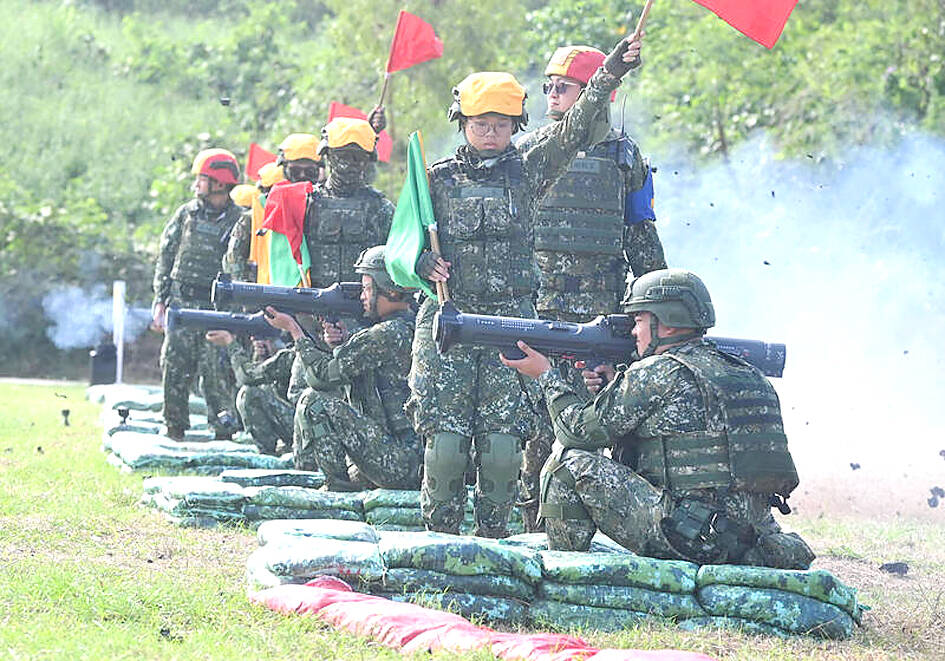Democratic Progressive Party (DPP) Legislator Puma Shen (沈伯洋) yesterday said he has proposed an amendment that would relieve former citizens of the obligation to serve in the military, following reports that a man who had forfeited his citizenship for Chinese residency was sent a service notice.
Taiwanese who have obtained People’s Republic of China (PRC) residency or citizenship should not be obligated to serve their mandatory military service, as this presents national security risks, Shen said.
Access to data and facilities for such people must be restricted to uphold national security, he added.

Photo: Taipei Times
Shen said he and DPP Legislator Wang Ting-yu (王定宇) delivered the amendments to the Act Governing Relations Between the People of the Taiwan Area and the Mainland Area (臺灣地區與大陸地區人民關係條例) to the legislature’s Internal Administration Committee on May 2.
A nation’s passport is an important symbol of one’s country, and the PRC is a foreign enemy force in the eyes of Taiwan, he said.
The existing regulations were intended to prevent people from dodging their obligations to Taiwan by citing their status in China, the draft says.
However, if the person is already a resident in China or holds a Chinese passport, it is clear that they have no sense of loyalty to Taiwan, it says.
The Chinese-language United Daily News previously reported that a person in Taipei was informed by their local district office last year that their nephew had to serve their mandatory service within three months or risk legal consequences.
However, their nephew had already renounced his Taiwanese citizenship and claimed PRC citizenship.
The Ministry of the Interior said that all men with PRC residency or citizenship who formerly held Taiwanese residency or citizenship are by law obligated to serve their mandatory military service, per Article 9-1 of the act.
This obligation should not be lifted simply because they are no longer citizens, the ministry said.
The ministry urged all people eligible for mandatory service not to try to dodge their obligations by forfeiting their citizenship or leaving the country, adding that the ministry would continue to work with local governments to ensure that household registry data are in sync.

Taiwan is projected to lose a working-age population of about 6.67 million people in two waves of retirement in the coming years, as the nation confronts accelerating demographic decline and a shortage of younger workers to take their place, the Ministry of the Interior said. Taiwan experienced its largest baby boom between 1958 and 1966, when the population grew by 3.78 million, followed by a second surge of 2.89 million between 1976 and 1982, ministry data showed. In 2023, the first of those baby boom generations — those born in the late 1950s and early 1960s — began to enter retirement, triggering

One of two tropical depressions that formed off Taiwan yesterday morning could turn into a moderate typhoon by the weekend, the Central Weather Administration (CWA) said yesterday. Tropical Depression No. 21 formed at 8am about 1,850km off the southeast coast, CWA forecaster Lee Meng-hsuan (李孟軒) said. The weather system is expected to move northwest as it builds momentum, possibly intensifying this weekend into a typhoon, which would be called Mitag, Lee said. The radius of the storm is expected to reach almost 200km, she said. It is forecast to approach the southeast of Taiwan on Monday next week and pass through the Bashi Channel

NO CHANGE: The TRA makes clear that the US does not consider the status of Taiwan to have been determined by WWII-era documents, a former AIT deputy director said The American Institute in Taiwan’s (AIT) comments that World War-II era documents do not determine Taiwan’s political status accurately conveyed the US’ stance, the US Department of State said. An AIT spokesperson on Saturday said that a Chinese official mischaracterized World War II-era documents as stating that Taiwan was ceded to the China. The remarks from the US’ de facto embassy in Taiwan drew criticism from the Ma Ying-jeou Foundation, whose director said the comments put Taiwan in danger. The Chinese-language United Daily News yesterday reported that a US State Department spokesperson confirmed the AIT’s position. They added that the US would continue to

The number of Chinese spouses applying for dependent residency as well as long-term residency in Taiwan has decreased, the Mainland Affairs Council said yesterday, adding that the reduction of Chinese spouses staying or living in Taiwan is only one facet reflecting the general decrease in the number of people willing to get married in Taiwan. The number of Chinese spouses applying for dependent residency last year was 7,123, down by 2,931, or 29.15 percent, from the previous year. The same census showed that the number of Chinese spouses applying for long-term residency and receiving approval last year stood at 2,973, down 1,520,